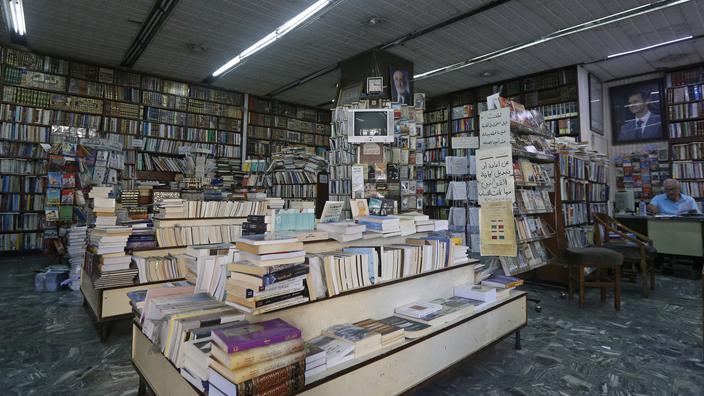In the heart of Damascus, booksellers and publishing houses, which experienced their golden age in the last century, are closing their doors one after the other, giving way to shoe stores or exchange offices.
Rue de la Poste, Salem al-Nouri, whose father founded the first bookstore in the Syrian capital in 1930, oversees the weaker and weaker sales, due to the economic crisis caused by the war in 2011.
Read alsoSyria: what will remain of the cultural heritage?
This 71-year-old bookseller does not hesitate to draw up a bitter observation of this worrying situation: “
People can no longer pay to read, and bookstores cannot cover their expenses.
Our bookstore is threatened with closure, just like the other establishments
”in Damascus.
Read also French bookstores managed to limit breakage in 2020
In a war-torn country, nearly 90% of Syrians now live below the poverty line and struggle to meet their most basic needs. Salem's family, which ran three bookstores, had to close one of them in 2018, Aalam al-Maarifa (“
The world of knowledge
”). But Salem continues to visit his now closed shop to dust off books and walk between the overcrowded shelves. He is not afraid to confide in his sadness: “
We wanted to bequeath this bookstore to our children and grandchildren, but the culture has regressed a lot in the country.
On an old desk hang pictures of him and his brothers, as well as those of famous clients who frequented their establishment, including artists, poets and former politicians.
The bookseller and publishing house Dar Oussama, founded in 1967, is also dying. However, Khalil Haddad and other employees are keen to come to work regularly, "
even if we do not sell a single book for several days
". He also in his seventies like Salem al-Nouri, passionate about books, he recalls how important it is to want to continue to protect culture: "
It is really a luxury to offer people to buy books nowadays, the priority being the purchase of food and medicine.
"
Resistant booksellers for culture
In recent years, several prestigious brands in central Damascus, well established in the 1950s and 1960s, have gone out of business.
The iconic bookstore and publishing house al-Yaqza al-Arabia ("
the Arab Awakening
"), opened in 1939, has thus given way to a shoe store.
Maysaloun, named after the battle between the Arab army and the French forces in 1920, has been replaced by a bureau de change.
"
We have published more than 300 books, and we had tens of thousands of books that we liquidated when we decided to close in 2014,
" insists Sami Hamdan, a still young man, only 40 years old.
His grandfather founded al-Yaqza al-Arabia which, like other Damascene publishing houses, published works by Syrian and Arab authors or translations, which readers tore over time.
And he explains again: “
The economic factor is essential, but technology has also contributed to the closure of bookstores, as entire generations have turned to the e-book.
".
Lucid, he concludes his remarks thus: “
The publishing world had already been in decline for decades, but the war finished it.
"
We have lost our readers one after another.
Many have left the country
Samar Haddad, bookseller in Damascus
After more than 70 years of good and loyal service dedicated to culture and books, Amer Tinbakji also resigned himself to closing his establishment, which opened in 1954. Since the start of the war, he stopped importing books, and did not may no longer edit due to sanctions and the collapse of the national currency. While nearly 800 publications per day were imported into the country before the war, their number has fallen to around five per day, underlines Ziad Ghosn, former director of the state publishing institution.
He also finds that the price of paper and printing has increased by at least 500% over the past two years.
But Samar Haddad is determined to fight.
She gathered in a basement the precious collection of books from her father's bookstore, Dar Atlas, which was located in central Damascus.
Today, working only with a single part-time employee, almost lost in the midst of rows of forgotten novels, she shares her dismay: “
We have lost our readers one after the other.
Many have left the country.
But determined to fight, Samar Haddad is still determined not to close his doors to keep his father's legacy alive.
His last words are full of hope: “
We will do anything to survive
”.















